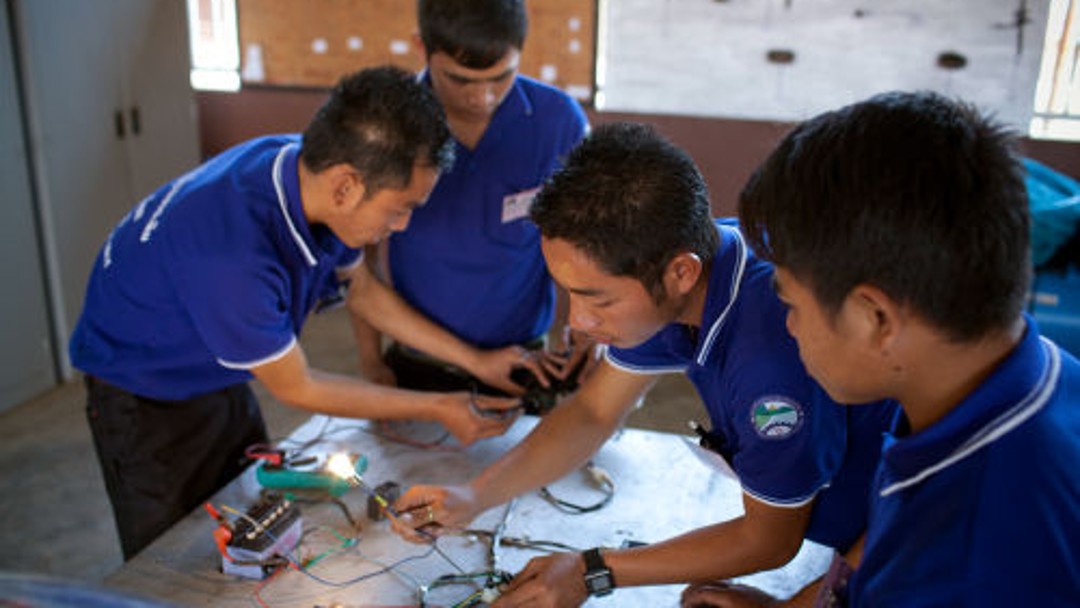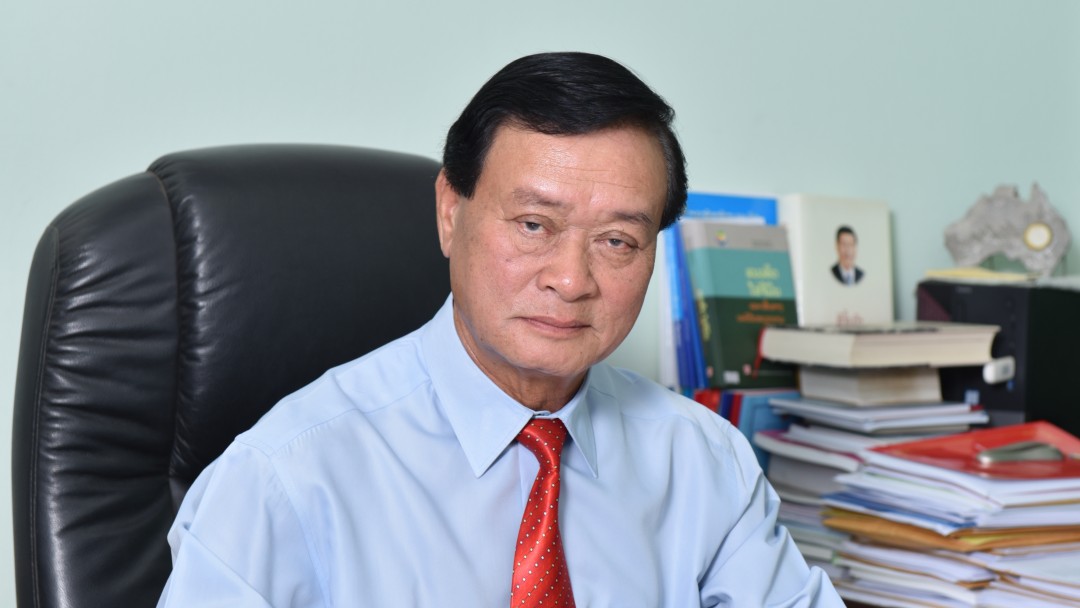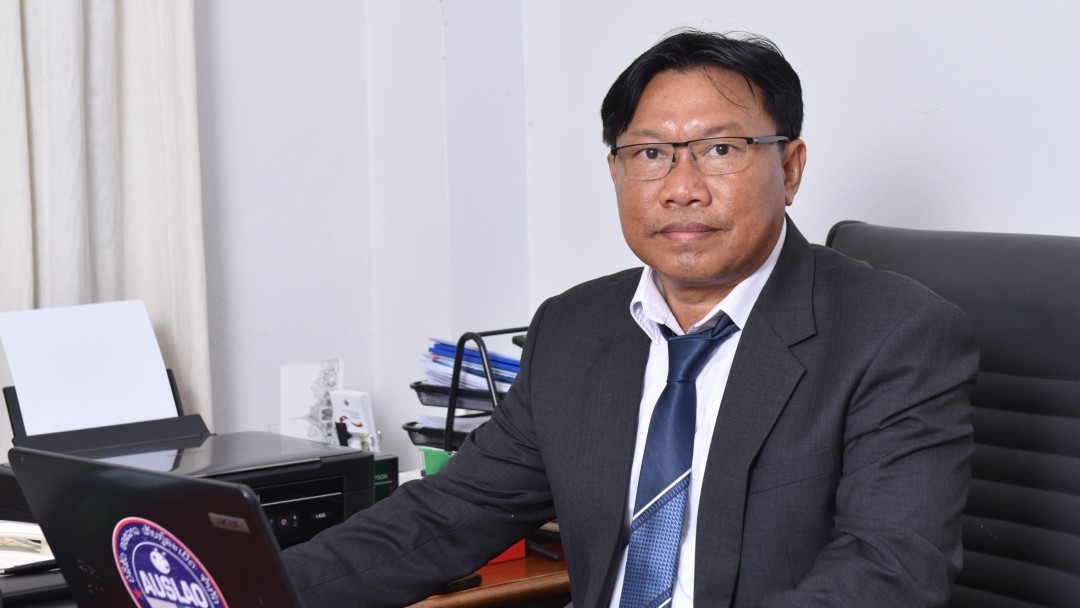News from 2019-12-23 / KfW Development Bank
Shortage of skilled workers in Laos
Innovative financing model for vocational training

Since 2004, KfW Development Bank has been supporting the establishment of a dual vocational training system in Laos. In the final phase, a new type of financing fund aims to strengthen the cooperation between vocational training facilities and the private sector throughout the country and take it into the future.
Thanks to the dual-cooperative training model, vocational school students gain practical experience during their training and leave school as skilled workers. Many Laotian managers studied in the former East Germany as part of development cooperation. Decades ago, they got to experience first-hand the advantages of this form of training, which is common in Germany. They are now promoting the development of a dual training system in their own country because the rapidly growing Laotian economy increasingly needs skilled workers – and there are still not enough. KfW Development Bank has been supporting Laos in the establishment of a dual vocational training system for fifteen years, with total commitments from funds of the German Federal Ministry for Economic Cooperation and Development (BMZ) amounting to more than EUR 30 million. “We are very pleased about the excellent cooperation with our Laotian partners,” explains Jan Wiegelmann, head of the KfW office in the Laotian capital Vientiane, “only by joining forces can we successfully reform education.” The establishment of the new vocational training system requires time, money and effort: until 1986 Laos had a planned economy and even today many vocational schools offer courses that are not relevant to the labour market. “I experience the shortage of skilled workers as a hindrance to growth, both for us and for our customers,” explains Chanthaboune Keobounekhoune, who previously studied in Leipzig and is now the CEO of a Laotian company for UXO clearance, which is involved in explosive ordnance clearance. Its customers include infrastructure companies, for example from the road or dam construction sector. And it is by no means only in these sectors that qualified workers are in demand.
Experience with the dual training system
Together with the Laotian Ministry of Education, KfW Development Bank has already completed four programmes to promote vocational training projects. Schools, workshops and dormitories were built, machines and teaching materials were provided and training for vocational school teachers was improved. The evaluation in 2018 was promising. The last phase is now focusing on an innovative financing fund: private companies and vocational schools can jointly apply for financial and technical support for new training programmes.
We spoke to the Lao Vice-Minister of Education Professor Kongsy Sengmany – who speaks excellent German as a former visiting student in East Germany – about the progress being made in educational reforms.
Dr Kongsy, why have so many Laotians not learned a profession which is needed on the labour market?
We are currently experiencing a massive upheaval in the demand for education. Office professions were especially popular for a while, but now there is a real boom in technical professions. What we lack is a continuous vocational focus and advisory services that are aligned with government development priorities and closely coordinated with private companies. The best way to meet this need is through dual training, which was also enshrined in law with the introduction of the TVET Act in 2013.
The Lao-German Technical College (LGTC) in the capital of Vientiane plays an important role in the introduction of dual education programmes. What sets this college apart?
All important basic professions for the metal and electrical industry are represented at the LGTC. Even now, training programmes are already flexibly geared to meet the needs of the economy. Around 650 students graduate from this educational institution every year – and there are three times as many applicants. A new campus is currently being added to the LGTC to enable new professions to be offered in heavy construction machinery and conveyor equipment that are in demand in the construction and mining industries
How is the dual training concept being received in the country?
The LGTC in particular has been able to gain experience in dual-cooperative training. The numbers here are very promising. The success stories, especially in the placement of vocational school graduates in jobs, have increased the popularity of this new concept because many people still believe the higher the level of education, the greater the vocational aptitude. Only about 10% of young people therefore pursue training as skilled workers, while 80% opt for higher qualifications or university studies. What is still lacking is an analysis of training needs based on clear labour market data, which would make it possible to classify training professions.

Can the success of the LGTC be transferred to other vocational schools?
The positive experience of the LGTC and its intensive contact with companies are well known throughout the country. Word has spread about the resulting “win-win situation” for the college and the companies and in the meantime a similar trend is beginning at other vocational schools. But knowledge of the concept of dual training and the principles of educational training does not spread automatically. I am sure that we still have a long way to go with the support of KfW and GIZ. As part of the current programme, we will now also break new ground on the important issue of financing dual training.
A financing fund is intended to support companies and vocational schools in developing joint vocational training programmes. How much interest is there from businesses?
Interest is generally high because we offer the opportunity to train qualified personnel in real operating conditions. However, companies with a European background and the corresponding experience have shown a particular interest in dual training. It will be important that we, together with the project team, succeed in convincingly presenting the objectives and conditions of this type of financing for vocational training. And the goal is to work with pioneers to create models that encourage other companies to get involved in vocational training.
What measures will be used to raise awareness of the fund?
We are using a wide range of possibilities: the project was presented to all school principals at the national vocational training conference. Informational events are taking place at the Lao National Chamber of Commerce and Industry and at foreign chambers of commerce in Laos. There is close cooperation with a number of industry organisations. And in addition to the existing advice centres, work is currently in full swing on an Internet portal where trained advisers will help with applications.
For which sectors is it particularly important to offer new training professions?
The programme does not exclude any industries. Still, there are, of course, priority areas, for example agriculture, mining, the tourism and service sectors and the manufacturing industry. A strong specialisation is needed in the technical area. New training courses, for example for high-voltage electricians, solar technicians, mechatronics engineers or IT experts, are just as important as fundamentally updating existing training programmes. In Laos, for example, you can pay by mobile phone in many shops. This also poses new challenges for traditional professions like accountants.
Laos and KfW Development Bank have been cooperating successfully for a long time. How important is it to share ideas with German experts?
Without this interaction and German support, we would not have been able to bring vocational training up to the level we have reached today. The aim now is to further increase the supply and quality of vocational training with relevance for the labour market. The country's economy is growing at a fast pace and many skilled workers are needed.

What the private sector hopes for
“Companies need a workforce that has up-to-date knowledge and technical expertise,” says Chanthaboune Keobounekhoune, CEO of the UXO Clearance company. And he gives an example: “I have very good contact with the UXO Lao Training Center in Laos. We regularly give the centre feedback on which teaching content is good and important. But there are not enough trainers there, and many trainers lack practical experience. Also, training is only provided on outdated detection equipment. My employees therefore take part in training in Germany. But the new financing programme now offers technical support for cooperation projects with vocational schools. I think this is a very interesting opportunity!”
The more people who recognise the opportunities, the faster vocational training in Laos can be reformed. For the benefit of businesses, the economy – and not least of all the many young people looking for work.

Share page
To share the content of this page with your network, click on one of the icons below.
Note on data protection: When you share content, your personal data is transferred to the selected network.
Data protection
Alternatively, you can also copy the short link: https://www.kfw-entwicklungsbank.de/s/enzBWrMC.CIiB
Copy link Link copied